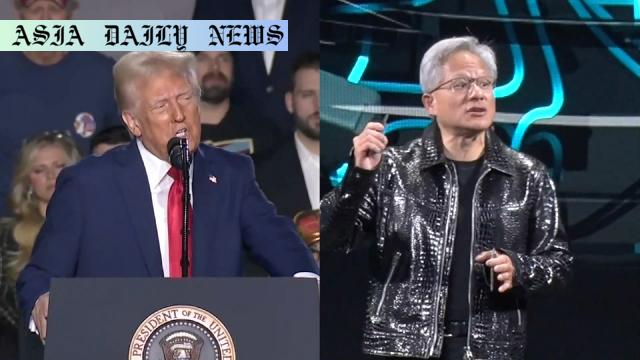Semiconductors: Trump and Nvidia CEO discuss AI, chip export controls, and US tech leadership amid global competition.
Trump met Nvidia CEO Jensen Huang for the first time to discuss semiconductors.
Topics included AI chip export restrictions and US tech leadership.
Nvidia is urging a review of January’s strict export control proposals.
US officials are investigating China-based AI firms bypassing chip restrictions.

Introduction: The Meeting Between Trump and Nvidia’s CEO
In a significant development in the semiconductor and AI technology sector, US President Donald Trump recently met with Nvidia’s CEO, Jensen Huang. The meeting provided an opportunity for the two influential figures to address some of the most pressing issues in the tech landscape, particularly focusing on chip export controls, AI innovation, and maintaining the United States’ leadership position in technology.
Topics of Discussion
The discussions reportedly revolved around AI chip exports, which play a critical role in global competition, especially with China. Nvidia has consistently voiced concerns regarding the Biden administration’s stringent export control policies introduced in January, which they believe could hamper innovation and economic progress. The semiconductor industry is at the core of technological advancements worldwide, making these discussions critical for the future of US-based tech companies.
Nvidia’s Position on Export Controls
Nvidia expressed its gratitude for the chance to discuss these vital issues with President Trump. The company’s stance on the export restrictions has been clear—they believe the limitations should be moderated to strike a balance between national security and fostering the overwhelming potential of AI and semiconductor technology. The stricter rules implemented to curb China’s military use of advanced AI chips are under scrutiny, with Nvidia pushing for revisions to accommodate broader technological growth.
Geopolitical Context and Challenges
The broader geopolitical context, particularly US-China relations, adds urgency to these deliberations. With intensifying competition over AI and semiconductor technology, policies that restrict chip exports have drawn both support and criticism. On one hand, such controls aim to protect national interests and prevent adversarial nations from exploiting US innovations. On the other, overly restrictive measures could stifle innovation, putting US companies like Nvidia at a disadvantage in the global marketplace.
Investigations Into Chinese Firms
One of the pressing concerns highlighted during these discussions is the allegation that Chinese generative AI startups, such as DeepSeek, might have circumvented US restrictions by acquiring Nvidia’s chips through intermediaries. This showcases the challenges in implementing effective export controls and highlights the ingenuity of firms looking to bypass such constraints. The US government is reportedly investigating these claims, making any policy adjustments even more critical.
Looking Ahead: Implications for US Leadership
Amidst the growing competition in AI and semiconductor technology, Trump’s stance on policy adjustments will be pivotal. Strengthening the US’s position as a global leader in technology requires balancing national security concerns with fostering innovation within the tech industry. As discussions continue to unfold, the global tech community will be watching closely for any policy announcements stemming from this crucial meeting.
Conclusion
President Trump’s meeting with Nvidia’s CEO marks an important step in addressing the challenges facing the US tech industry. The outcome of these discussions could shape the future of AI and semiconductor development, setting the stage for the United States to maintain its leadership in this critical sector. The delicate balance between security and innovation will remain a focal point for policymakers as these conversations progress.
Commentary
Understanding the Importance of This Meeting
The recent meeting between President Trump and Jensen Huang, Nvidia’s CEO, signals the growing importance of semiconductors and AI technology in global geopolitics. These discussions bring much-needed attention to the impacts of strict export controls, not just on international relations but also on business innovation within the US. Ensuring that the US remains competitive in technology is paramount for economic and security reasons.
The Dilemma of Export Controls
Export controls present an undeniable dilemma. On one side, they are a safeguard against adversarial use of advanced technologies, preserving national security. On the other, they create significant challenges for companies like Nvidia that thrive on international markets. Modern technological advancements often require a global audience, making restrictive policies counterproductive for some businesses. Striking a balance is crucial, yet immensely challenging given the delicate global political landscape.
The Importance of US Tech Leadership
As the world edges closer to an AI-driven future, maintaining leadership in semiconductor technology is critical for the US. This meeting between Trump and Huang highlights the imperative of aligning national policies with the needs of the industry. Ignoring the voices of tech leaders like Nvidia could lead to setbacks in innovation, allowing other nations to close the gap in technological advancement.
A Balanced Path Forward
The outcome of these deliberations could potentially dictate the trajectory of AI and semiconductor innovation in the US. Policymakers must carefully navigate this path, incorporating both the experiences of leading tech companies and the nation’s strategic objectives. Collaboration and open dialogue, such as this meeting, are steps in the right direction.


